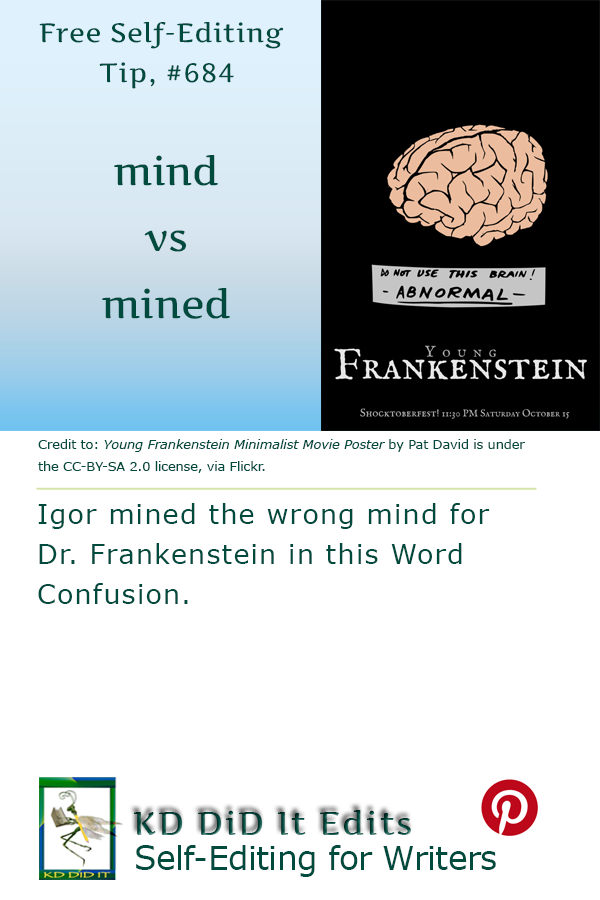Revised as of
9 Dec 2022
Bet ya didn’t expect mind vs mined to be an heterograph (a subset of homophone)? Yep, those heterographs are everywhere.
Consider, though, that a mind unmined is a terrible thing to waste, and writers are certainly not guilty of that, lol!
Word Confusions . . .
. . . started as my way of dealing with a professional frustration with properly spelled words that were out of context in manuscripts I was editing as well as books I was reviewing. It evolved into a sharing of information with y’all. I’m hoping you’ll share with us words that have been a bête noire for you from either end.
If you found this post on “Mind versus Mined” interesting, consider tweeting it to your friends. Subscribe to KD Did It, if you’d like to track this post for future updates.
| Mind | Mined |
|---|---|

RobertFuddBewusstsein17Jh by Robert Fludd is in the public domain, via Wikimedia Commons. — The mind as mapped out by philosopher Robert Fludd in 1619. |

Eagle Mine by el-toro is under the CC BY 2.0 license, via VisualHunt. — The Eagle Mine mined nickel ore. |
| Part of Grammar: | |
| Noun; Verb, intransitive & transitive Plural for the noun: minds Third person present verb: minds |
Morpheme: mine, and I’m ignoring the possessive determiner and pronoun.
Noun; Verb, intransitive & transitive Plural for the noun: mines Third person present verb: mines |
| Noun: The element of a person that enables them to be aware of the world and their experiences, to think, and to feel
Intellect or understanding, as distinguished from the faculties of feeling and willing
[Psychology] The totality of conscious and unconscious mental processes and activities A person’s attention
A particular instance of the intellect or intelligence, as in a person Reason, sanity, or sound mental condition A way of thinking and feeling
A state of awareness or remembrance Opinion, view, or sentiments Inclination or desire Purpose, intention, or will Psychic or spiritual being, as opposed to matter A conscious or intelligent agency or being Remembrance or recollection
Attention
[Chiefly South Midland and Southern US] Notice
[Roman Catholic Church] A commemoration of a person’s death, especially by a Requiem Mass [Initial capital letter] Mind
Verb, intransitive:
To pay attention To obey [Used chiefly in the imperative] To take notice, observe, or understand To be careful or wary [Often used in negative or interrogative constructions] To care, feel concern, or object To regard a thing as concerning oneself or as mattering Verb, transitive:
[Often with negative] Regard as important
[With clause, in imperative] Used to urge someone to remember or take care to bring about something
Take care of temporarily [With infinitive; be minded] Be inclined or disposed to do a particular thing To regard as concerning oneself or as mattering To pay attention to To apply oneself or attend to [Dialect] To perceive or notice [Dialect] To remember [Dialect] To remind |
Noun: An excavation in the earth for extracting coal or other minerals
A type of bomb placed on or just below the surface of the ground or in the water that detonates when disturbed by a person, vehicle, or ship
Verb, intransitive: Verb, transitive:
Lay explosive mines on or just below the surface of (the ground or water)
|
| Examples: | |
| Noun: As the thoughts ran through his mind, he came to a conclusion. It’s hard to fathom the processes of the human mind. People have the price they are prepared to pay settled in their minds. I wrote a letter in my mind. He had a keen mind. The company’s name slips my mind. He was one of the greatest minds of his time. I expect my employees to keep their minds on the job. Anyone can lose weight if they set their mind to it. Paul is going to lose his mind. She has a liberal mind. The poem puts me in mind of experiences both new and forgotten. I reserve the right to change my mind. She’d have to be of a mind to listen. Let me know your mind on this matter before Tuesday. Former days were called to mind. He can’t keep his mind on his studies. When he’s like that, just pay him no mind. He had an awareness of a mind ordering the universe. Verb, intransitive: We’ve got some decorations up — not a lot, mind you. Be early to bed tonight, mind. Mind now, I want you home by twelve. “Mind if I go?” “Don’t mind if you do.” You mustn’t mind about their gossiping. Verb, transitive: What does that mean, if you don’t mind my asking? Do you mind if I have a cigarette? I don’t mind admitting I was worried. I wouldn’t mind some coaching from him! Never mind the opinion polls. Mind you look after the children. Mind your head on that cupboard! Mind the gap! You think about how much Cal does for you, and you mind her, you hear? I mind the time when he lost his false teeth. We left our husbands to mind the children while we went out. He was minded to reject the application. The Board was given leave to object if it was so minded. Mind what you say. Would you mind handing me that book? I’d like to remind you to mind your own business. Don’t mind his bluntness. |
Noun: The copper mine is about played out. The book contains a mine of information. Be careful, this field is laced with land mines. Military mines were used as early as 334 B.C. at the siege of Halicarnassus and in 332 B.C. at Gaza. Verb, intransitive: As children, we mined for China. The area was heavily mined. The entrance to the harbor had been mined. Verb, transitive: The hills were mined for copper oxide. How do they manage to mine such a rich vein of talent? If you mined bitcoin, you had to do it faster than anyone else. We heavily mined the area. They tunneled under and mined the castle wall. |
| Derivatives: | |
| Adjective: unminding Noun: submind |
Adjective: minable, mineable, unmined |
| History of the Word: | |
| Old English gemynd meaning memory, thought is of Germanic origin, from an Indo-European root meaning revolve in the mind, think, shared by the Sanskrit manas and the Latin mens meaning mind. | Late Middle English from the Old French mine (noun), miner (verb), and perhaps of Celtic origin.
Compare with the Welsh mwyn meaning ore. |
C’mon, get it out of your system, bitch, whine, moan . . . which words are your pet peeves? Also, please note that I try to be as accurate as I can, but mistakes happen or I miss something. Email me if you find errors, so I can fix them . . . and we’ll all benefit!
Satisfy your curiosity about other Word Confusions on its homepage or more generally explore the index of self-editing posts. You may also want to explore Book Layout & Formatting Ideas, Formatting Tips, Grammar Explanations, Linguistics, Publishing Tips, the Properly Punctuated, Writing Ideas and Resources, and Working Your Website.
Resources for Mind versus Mined
Apple Dictionary.com
Dictionary.com: mind
Pinterest Photo Credits:
Young Frankenstein Minimalist Movie Poster by Pat David is under the CC-BY-SA 2.0 license, via Flickr.


